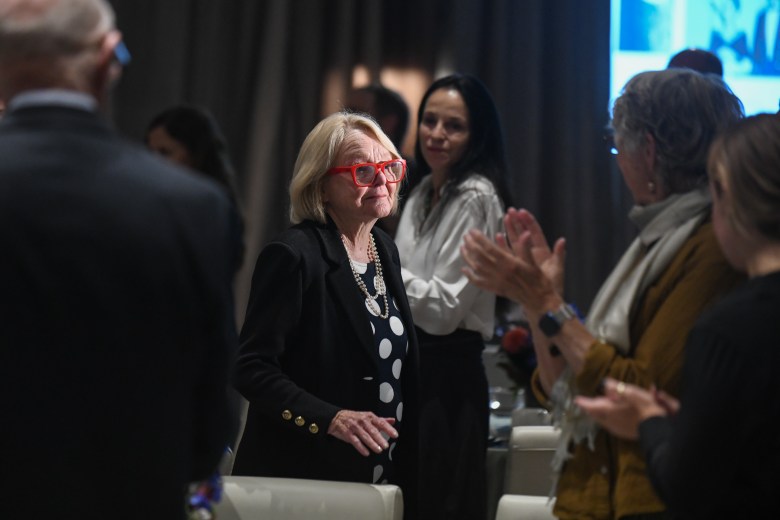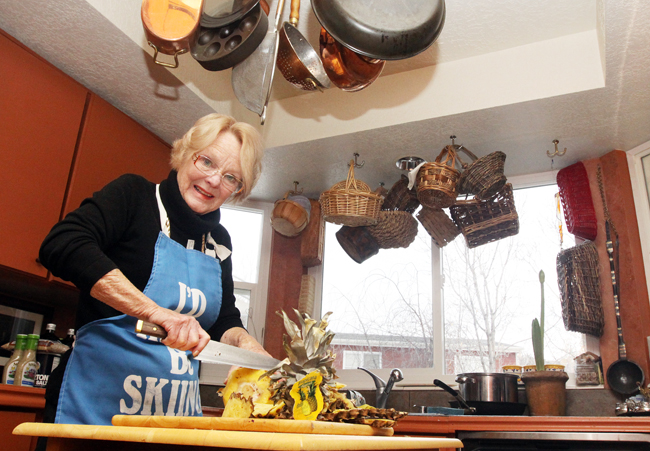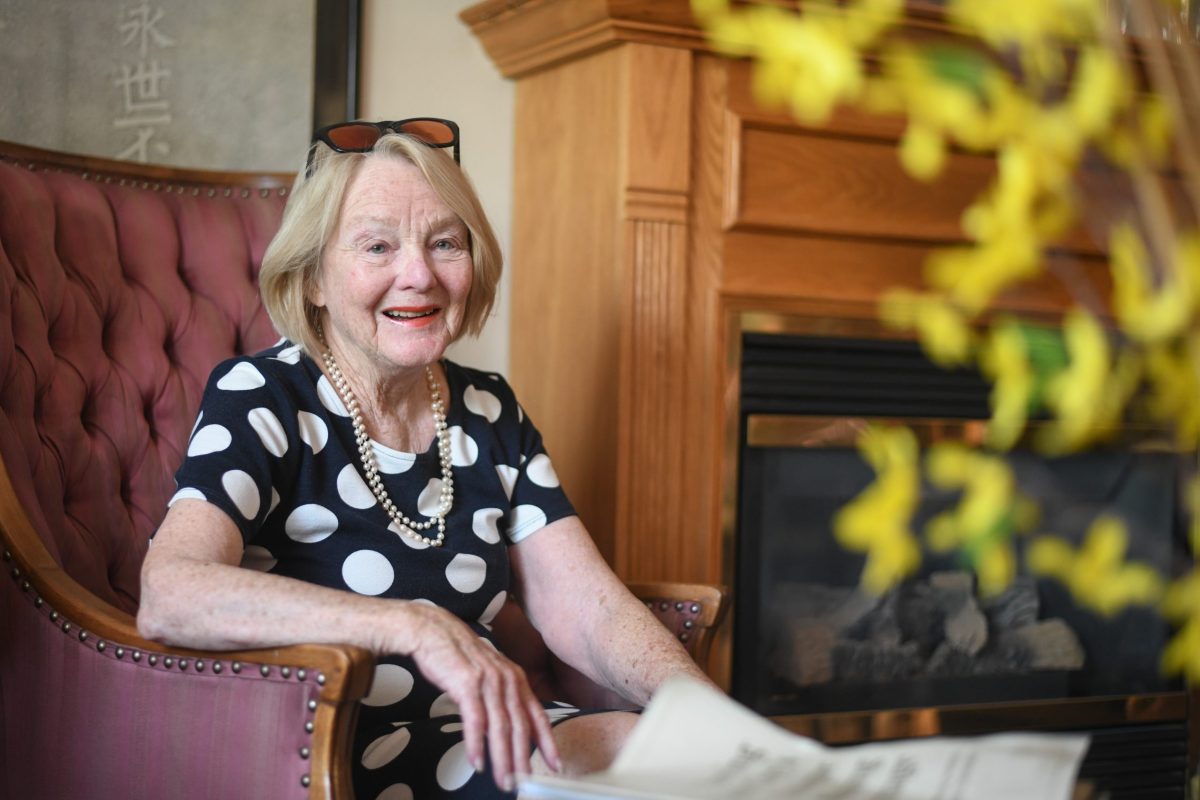Park City was still finding its feet in the summer of 1985 when Sally Cousins Elliott’s daughter took a tumble biking home from day camp near the underpass on Deer Valley Drive. Ramshackle buildings lined Main Street, every other door boarded up.
Sally was away from home at the time with her husband, Torch, building cabinets for their new kitchen in the shop room at Hill Air Force Base when the news came in. Eight-year-old Cat needed stitches, 10-year-old (future) Dr. Libby declared. A trained professional was inclined to agree, though there was no promise that the kids could pay up.
As a thank you, Sally wrote letters to the doctor and day camp director saying she would do anything to repay their kindness and trust. That gesture led to a call asking her to join the city’s parks and recreation advisory board — forging the start of a 40-year commitment to the Park City community.
This week, the Park City Chamber/Bureau honored Sally for her contributions with the Myles Rademan Spirit of Hospitality Award during its annual meeting at Pendry Park City.
The honor is bestowed upon residents who embody the vision of Park City and aspire to make the community a better, more inclusive place. It’s named after Rademan, who served as a city planning director in the late ’80s and is the brain behind City Hall’s leadership program.
“What started as a kind of mentorship quickly turned into a partnership,” he said during the award ceremony on Wednesday. “So many of the amenities that we take for granted in our town have her fingerprints all over them.”
It wasn’t intentional on Sally’s part. She just wanted to help bring people together. After all, she knows how to work a room, and she hates being bored.
Sally skipped her senior year of high school in Muskogee, Oklahoma, to study sociology at the University of Oklahoma. She met Torch there in 1961, becoming best friends and eventually sweethearts before he departed with the Army for Vietnam.
The couple married in 1967 when Torch returned, spending the next 20 years traveling the world for his military career. They spent two years in Korea, a stint in Alaska and some time in Texas before Torch decided to retire from the military and attend graduate school. But it was up to Sally to decide where.
Snow was the only thing Sally cared about. Skiing was an Elliott family passion with all three children, including son Chip who was attending West Point and competing on racing teams. Initially, they only planned to stay until Torch completed his PhD. But two months in, after that first Miners Day parade, they were hooked.
“We sat down with a drink and looked at each other like ‘Why the hell would we ever leave a place like this?’ and we decided OK, we’re staying,” she said sitting on the back porch of her Prospector home. The Elliotts purchased it for $95,000 two years after they moved to Park City. “When you’ve lived all over the world, you pretty much know a good place.”
Sally said the family came at the right time. Only a couple thousand people were living in the city then, and everyone knew everyone.
It didn’t take long for Sally to become a standout figure with her magnetic energy, firecracker spirit, fierce determination and sharp wit. Her unvarnished honesty and unexpectedly colored vocabulary added to the charm, too.

Sally also dove headfirst into challenges despite not always having experience and never shied away from asking questions. As an Army wife, she always liked to research the history of the new places her family was living in to help them connect to their new home, so she did the same thing in Park City.
Parkites took Sally for tours around town, and eventually her work on the parks and recreation board led her to become connected with City Hall staff such as Rademan, former City Manager Toby Ross and former Park City Mayor Brad Olch.
Her inaugural task was to help “green” Park City.
“This is an old community. We can’t talk about firsts, right? Because things have happened, and then they’ve fallen by the wayside, and then they’re rehabbed,” Sally said.
She was in charge of collecting donations to benefit the cemetery, though she confessed she had no idea what she was doing. Sally found discounted lilac shrubs for sale through the Lone Peak correctional facility and purchased 50. Olch contributed a portion of wedding officiant fees to the mayor’s tree fund, which helped beautify the lawn.
Sally went on to become chair of the parks and recreation board and started the city’s garden club. Yet she felt like there was still work to be done, particularly at the south end of City Park.
“I decided if nobody else was going to clean it up … I better run for office and make sure it happens,” Sally said.
So, she did. Voters elected her to the Park City Council, and Sally served from 1990 to 1994. During that time, she said she “didn’t get one damn thing done.” Others, however, might disagree.
Park City Municipal purchased the McPolin Osguthorpe farm the year Sally took office, to ensure the open space was permanently preserved. The City Council also started a committee to tackle land issues, which later broke off to become Utah Open Lands.
Two years later, Sally was a part of negotiations to create what is now the Historic Union Pacific Rail Trail. She employed “40 fabulous felons” who worked alongside her from April to October.
At the end of her term, Sally decided to forgo reelection in favor of running for the Utah Legislature. As a woman and a Democrat in the mid-1990s, it didn’t work.
Instead, Sally started a destination management company that she ran for 10 years called Utah Escapades. However, she was called to service again in 2004.
Summit County operated under a three-person commission style of government in which elected officials held both the executive and legislative power. Former Commissioner Shauna Kerr, the first woman elected to the panel, planned to retire, and Sally felt like there needed to be someone to represent trails and open space.
Voters elected Sally to represent them. She served with former Commissioners Bob Richer and Ken Woolstenhulme until Summit County Proposition 1 was approved in November 2006, creating a five-member council and county manager position. Sally served another term as a county councilor in 2008 to help with the transition and share institutional knowledge.
The county mostly dealt with infrastructure issues such as the landfill and recycling center. Otherwise, the most pressing issues then were mostly the same as they are today.
Sally is most proud of her work on trails, open space and affordable housing. Her biggest regret is that she was never able to see stronger preservation ordinances approved in the county code.
She’s also been instrumental in historical preservation efforts across Utah. Sally has served on numerous boards over the years, including the Utah Quality Growth Commission, the Utah Heritage Foundation, the Park City Chamber/Bureau, Mountain Trails Foundation, Utah Women’s Political Caucus, Park City Historical Society and Recycle Utah.

Whenever there’s a problem in Park City, Sally said somebody rises to take charge. For her, that often occurs in the kitchen.
She learned to help her mother entertain guests when she was a preteen, collecting recipes from McConnell’s magazine and Better Homes and Gardens. She’s since become an expert in “Scotch whisky diplomacy,” though she isn’t afraid to break out her secret weapons: soup and lots of bacon.
That’s how the Friends of Ski Mountain Mining History, her most recent passion project, formed, as it turns out.
“If you’re sitting at somebody’s dinner table, the fact that there are four different opinions at the table and pretty much two sides to everything, you can sort of get a pickle off the tray and put it in your mouth and suck on it for a minute,” Sally explained. “People are much more willing to share if they’re sitting in a home.”
And to Sally, that’s exactly what hospitality is. It means bringing people together, taking care of one another and everyone pitching in for the common good. It’s sharing the same warm welcome she received when she moved to Park City with newcomers as well as passing on, and preserving, the good things the community has to offer.

